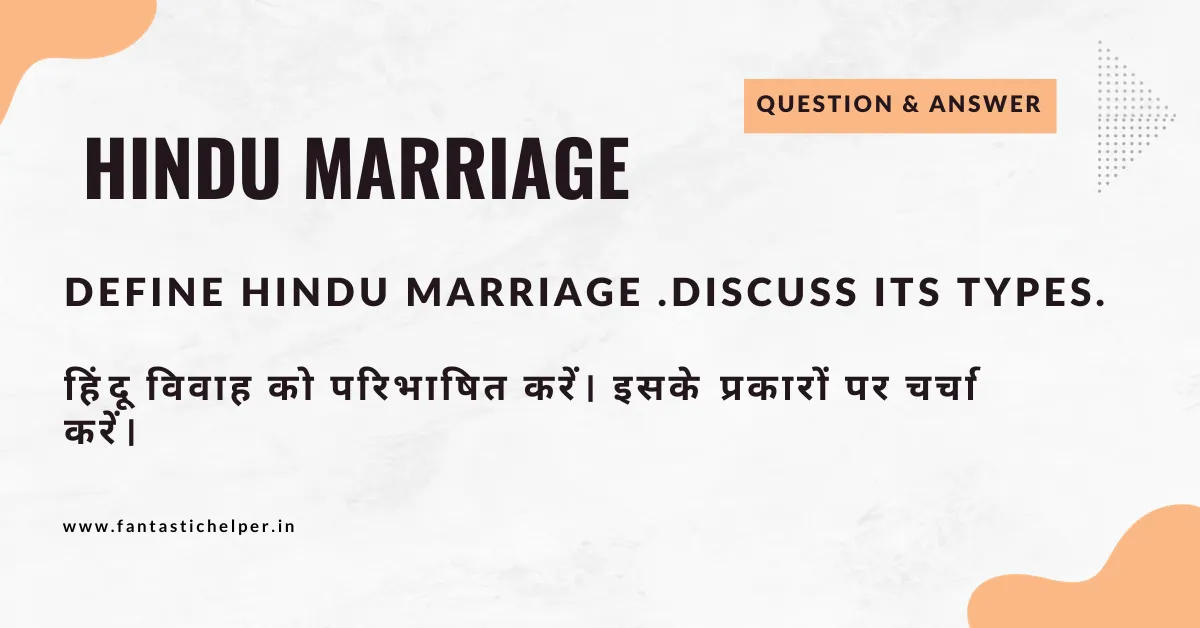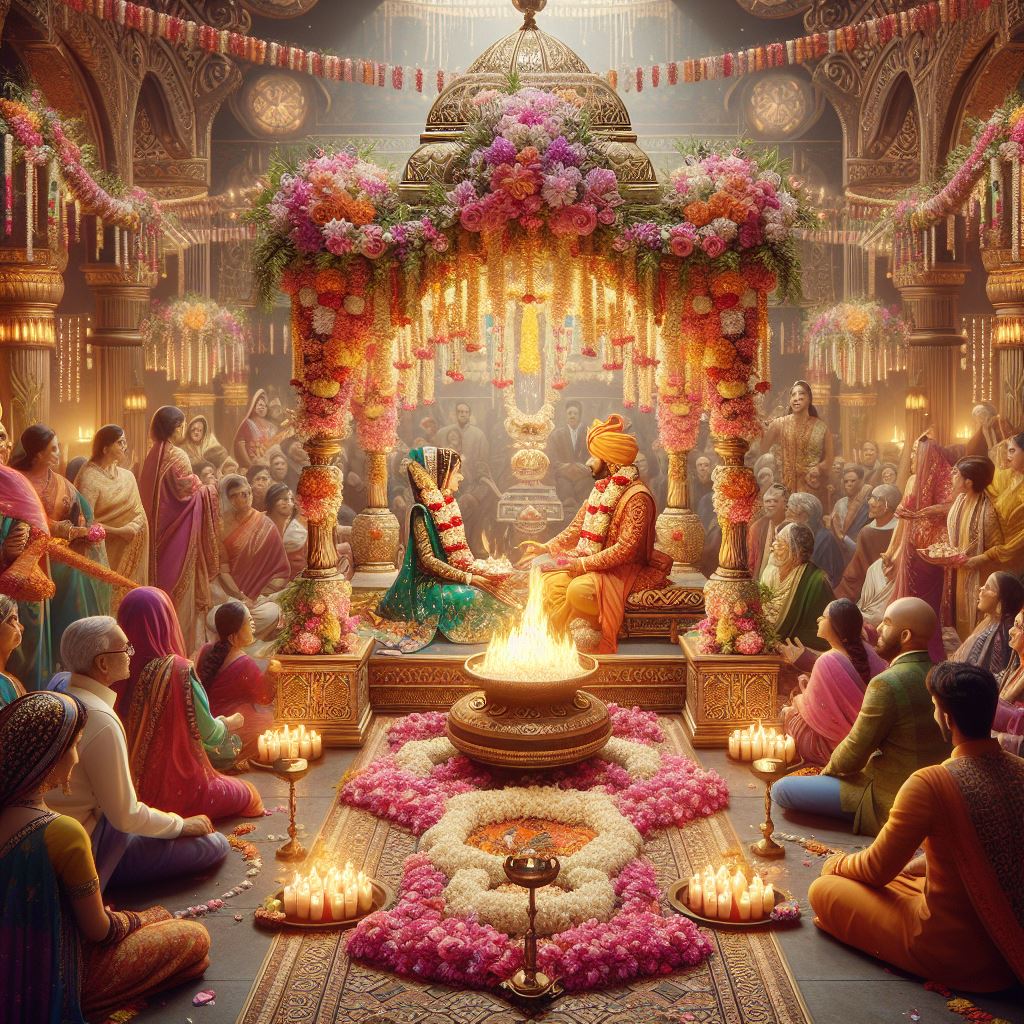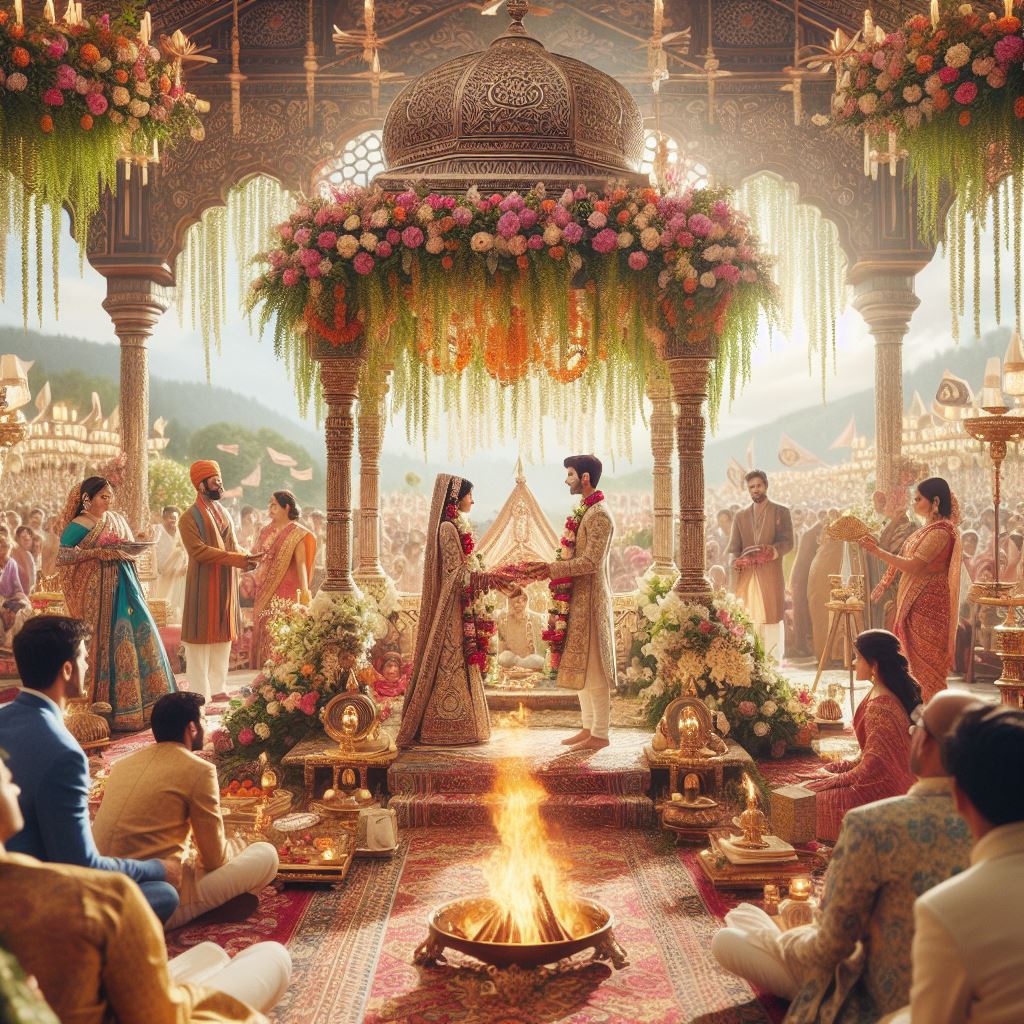Define Hindu Marriage .Discuss its types.
हिंदू विवाह को परिभाषित करें। इसके प्रकारों पर चर्चा करें।
Introduction to Hindu Marriage:
Hindu marriage, deeply rooted in ancient traditions and spiritual beliefs, is a sacred union that transcends the realms of earthly existence. It is not merely a social contract but a sacrament, intricately woven into the fabric of Hindu culture and philosophy. Shaped by the diverse tapestry of regional customs and rituals, Hindu marriages reflect the rich heritage and timeless wisdom encapsulated in scriptures such as the Vedas and the Dharmashastra.
At its core, Hindu marriage is considered a divine covenant, a union not only of two individuals but also of their souls. The sacred rites and ceremonies associated with Hindu weddings are symbolic expressions of spiritual commitment, mutual respect, and the eternal bond that the couple aspires to forge. The journey towards marital bliss is guided by the principles of dharma (righteousness), artha (prosperity), kama (pleasure), and moksha (liberation), encompassing the holistic growth and fulfillment of the couple.
The diversity within Hinduism manifests in the myriad rituals observed during marriage ceremonies, ranging from the vivaha homa (sacred fire ritual) to the saat phere (seven vows) taken around the sacred fire. These rituals not only signify the solemnization of the marriage but also encapsulate the values of duty, fidelity, and spiritual awakening.
In this introduction to Hindu marriage, we embark on a journey to explore the profound significance, cultural nuances, and spiritual dimensions that define this sacred institution, echoing through the ages and uniting hearts in the eternal dance of love and commitment.
हिंदू विवाह का परिचय:
हिंदू विवाह, जो प्राचीन परंपराओं और आध्यात्मिक मान्यताओं में गहराई से निहित है, एक पवित्र मिलन है जो सांसारिक अस्तित्व के दायरे से परे है। यह महज एक सामाजिक अनुबंध नहीं बल्कि एक संस्कार है, जो हिंदू संस्कृति और दर्शन के ताने-बाने में जटिल रूप से बुना गया है। क्षेत्रीय रीति-रिवाजों और अनुष्ठानों की विविध टेपेस्ट्री द्वारा आकार में, हिंदू विवाह वेदों और धर्मशास्त्र जैसे ग्रंथों में निहित समृद्ध विरासत और कालातीत ज्ञान को दर्शाते हैं।
इसके मूल में, हिंदू विवाह को एक दैवीय वाचा माना जाता है, जो न केवल दो व्यक्तियों का बल्कि उनकी आत्माओं का भी मिलन है। हिंदू शादियों से जुड़े पवित्र संस्कार और समारोह आध्यात्मिक प्रतिबद्धता, आपसी सम्मान और उस शाश्वत बंधन की प्रतीकात्मक अभिव्यक्ति हैं, जिसे जोड़े बनाना चाहते हैं। वैवाहिक आनंद की ओर यात्रा धर्म (धार्मिकता), अर्थ (समृद्धि), काम (खुशी), और मोक्ष (मुक्ति) के सिद्धांतों द्वारा निर्देशित होती है, जो जोड़े के समग्र विकास और पूर्णता को शामिल करती है।
हिंदू धर्म के भीतर विविधता विवाह समारोहों के दौरान मनाए जाने वाले असंख्य अनुष्ठानों में प्रकट होती है, जिसमें विवाह होम (पवित्र अग्नि अनुष्ठान) से लेकर पवित्र अग्नि के चारों ओर लिए गए सात फेरे (सात वचन) तक शामिल हैं। ये अनुष्ठान न केवल विवाह के समापन का प्रतीक हैं बल्कि कर्तव्य, निष्ठा और आध्यात्मिक जागृति के मूल्यों को भी समाहित करते हैं।
हिंदू विवाह के इस परिचय में, हम इस पवित्र संस्था को परिभाषित करने वाले गहन महत्व, सांस्कृतिक बारीकियों और आध्यात्मिक आयामों का पता लगाने के लिए एक यात्रा पर निकलते हैं, जो युगों से गूंजती है और प्रेम और प्रतिबद्धता के शाश्वत नृत्य में दिलों को एकजुट करती है।
Types of Hindu marriages:
Hindu marriages encompass a diverse array of rituals and customs, reflecting the rich cultural tapestry of the religion. Various types of Hindu marriages exist, each influenced by regional practices, community traditions, and historical contexts. Here are some notable types of Hindu marriages:
-
Brahma Vivaha:
- This is the most revered and ideal type of Hindu marriage, where the father gives away his daughter to a suitable groom with the couple’s mutual consent. It is characterized by simplicity, religious ceremonies, and the exchange of vows before the sacred fire.
-
Daiva Vivaha:
- In this type of marriage, the father gifts his daughter to a priest or a sage as a form of religious offering. It is considered a less common and somewhat ritualistic form of marriage.
-
Arsha Vivaha:
- Arsha Vivaha involves the groom offering a symbolic gift, often a cow or a bull, to the bride’s father. This type of marriage signifies a bond rooted in mutual respect and understanding.
-
Prajapatya Vivaha:
- This type of marriage involves a simple exchange of vows between the bride and groom in the presence of a sacred fire. It is marked by the absence of elaborate rituals and dowry.
-
Gandharva Vivaha:
- Gandharva Vivaha is a love marriage or a union by mutual consent, often without the involvement of parents. It is considered a more liberal and unconventional form of marriage.
-
Asura Vivaha:
- In this type of marriage, the groom offers a significant amount of wealth or dowry to the bride’s family. This practice, though prevalent historically, has been criticized for its materialistic nature.
-
Rakshasa Vivaha:
- This type of marriage involves the groom winning the bride’s consent through force or abduction. While this was accepted in ancient times, it is now considered an outdated and unacceptable practice.
-
Paishacha Vivaha:
- Paishacha Vivaha involves taking advantage of an individual who is mentally unstable or unconscious. This form of marriage is condemned and considered morally reprehensible.
It’s important to note that the emphasis on different types of marriages may vary across Hindu communities and regions. Modern Hindu weddings often incorporate a mix of these types, adapting to the evolving social and cultural landscape while still retaining the essence of the sacred union.
हिंदू विवाह के प्रकार:
हिंदू विवाह में विभिन्न प्रकार के अनुष्ठान और रीति-रिवाज शामिल होते हैं, जो धर्म की समृद्ध सांस्कृतिक छवि को दर्शाते हैं। विभिन्न प्रकार के हिंदू विवाह मौजूद हैं, जिनमें से प्रत्येक क्षेत्रीय प्रथाओं, सामुदायिक परंपराओं और ऐतिहासिक संदर्भों से प्रभावित हैं। यहां हिंदू विवाहों के कुछ उल्लेखनीय प्रकार हैं:
ब्रह्म विवाह:
यह हिंदू विवाह का सबसे प्रतिष्ठित और आदर्श प्रकार है, जहां पिता जोड़े की आपसी सहमति से अपनी बेटी को एक उपयुक्त दूल्हे को सौंप देता है। इसकी विशेषता सादगी, धार्मिक समारोह और पवित्र अग्नि के समक्ष प्रतिज्ञाओं का आदान-प्रदान है।
दैव विवाह:
इस प्रकार के विवाह में, पिता अपनी बेटी को धार्मिक भेंट के रूप में किसी पुजारी या साधु को उपहार में देता है। इसे विवाह का कम सामान्य और कुछ हद तक अनुष्ठानिक रूप माना जाता है।
अर्श विवाह:
अर्श विवाह में दूल्हे को दुल्हन के पिता को एक प्रतीकात्मक उपहार, अक्सर एक गाय या एक बैल, देना शामिल होता है। इस प्रकार का विवाह आपसी सम्मान और समझ में निहित बंधन का प्रतीक है।
प्रजापत्य विवाह:
इस प्रकार के विवाह में दूल्हा और दुल्हन के बीच पवित्र अग्नि की उपस्थिति में प्रतिज्ञाओं का एक सरल आदान-प्रदान शामिल होता है। यह विस्तृत अनुष्ठानों और दहेज की अनुपस्थिति द्वारा चिह्नित है।
गंधर्व विवाह:
गंधर्व विवाह एक प्रेम विवाह या आपसी सहमति से किया गया मिलन है, अक्सर माता-पिता की भागीदारी के बिना। इसे विवाह का अधिक उदार और अपरंपरागत रूप माना जाता है।
असुर विवाह:
इस प्रकार के विवाह में, दूल्हा दुल्हन के परिवार को पर्याप्त मात्रा में धन या दहेज देता है। यह प्रथा, हालांकि ऐतिहासिक रूप से प्रचलित है, इसकी भौतिकवादी प्रकृति के लिए आलोचना की गई है।
राक्षस विवाह:
इस प्रकार के विवाह में दूल्हे को बलपूर्वक या अपहरण के माध्यम से दुल्हन की सहमति प्राप्त करना शामिल होता है। जबकि इसे प्राचीन काल में स्वीकार किया गया था, अब इसे एक पुरानी और अस्वीकार्य प्रथा माना जाता है।
पैशाच विवाह:
पैशाच विवाह में ऐसे व्यक्ति का फायदा उठाना शामिल है जो मानसिक रूप से अस्थिर या बेहोश है। विवाह के इस रूप की निंदा की जाती है और इसे नैतिक रूप से निंदनीय माना जाता है।
यह ध्यान रखना महत्वपूर्ण है कि विभिन्न प्रकार के विवाहों पर जोर हिंदू समुदायों और क्षेत्रों में भिन्न हो सकता है। आधुनिक हिंदू शादियों में अक्सर इस प्रकार का मिश्रण शामिल होता है, जो पवित्र मिलन के सार को बरकरार रखते हुए विकसित होते सामाजिक और सांस्कृतिक परिदृश्य को अपनाता है।


